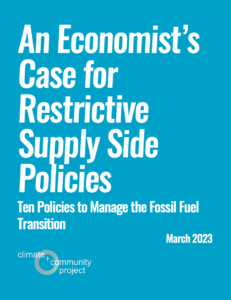Full Title: An Economist’s Case for Restrictive Supply Side Policies: Ten Policies to Manage the Fossil Fuel Transition
Author(s): Mark Paul and Lena Moe
Publisher(s): Climate and Community Project
Publication Date: March 20, 2023
Full Text: Download Resource
Description (excerpt):
Focusing on demand leaves out the flipside of the coin: supply-side action. Heretofore, policymakers have been hesitant to employ restrictive supply-side policies— in other words, explicitly phasing out the supply of fossil fuels—on the theory that increasing the demand for clean energy will crowd fossil fuels out of the marketplace. Implicit in this strategy is the assumption that fossil fuel firms will voluntarily close their doors as they get pushed out and exit the market in an orderly fashion. They will
not. Without discrete restrictive supply-side planning and policy, the end of fossil fuels will be a chaotic collapse where workers, communities, and the environment suffer.
In this report, we explain the economic rationale—and climate necessity—of deploying restrictive supply-side policies to actively wind down fossil fuel extraction. Levers like bans, restrictions, or phaseouts are not new; in fact, history shows that products can go quickly from commonplace to banned. In the last four decades, the United States has outlawed lead paint, phased out asbestos,
and curtailed tobacco marketing and sales. Similar policies can be used for fossil fuels; indeed, comparable policies are in place in other countries and at the state level. The International Energy Agency has made it clear: If the planet is to remain habitable, fossil fuel extraction must end.
Common sense climate policy should address the supply and demand sides in tandem and with equal ambition. Coordination between supply- and demand-side policy is crucial for a just, managed, and full transition. Ratcheting down fossil fuels in step with the ramp up of clean energy can balance the transition, lowering the possibility of price hikes or energy scarcity. By coupling supply- and demand-side action, policymakers can provide a just transition for workers and frontline communities, curtail emissions, and mobilize resources in an efficient manner.
